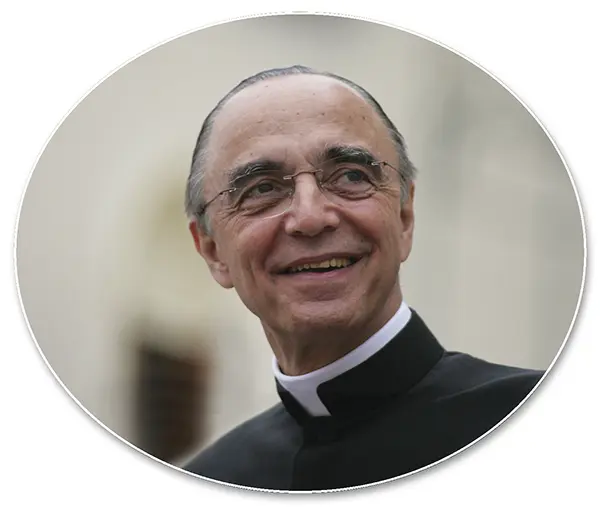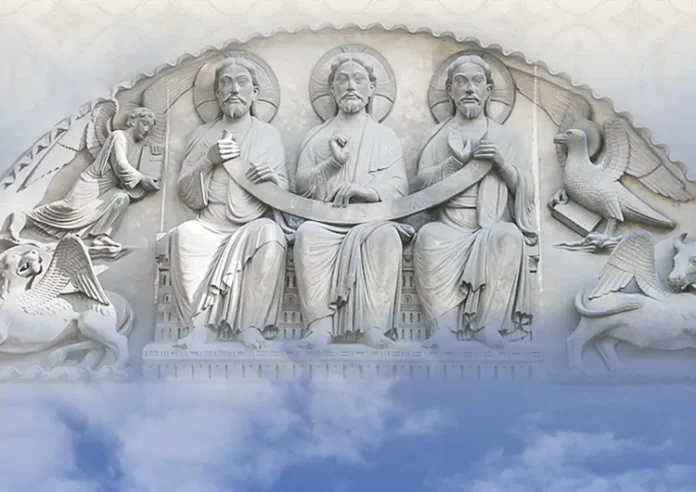When we analyse the work of creation, it is striking to note the exuberance of generosity manifested by God throughout the universe, from the smallest pebbles to intelligent creatures, Angels and humans.
We see this in mineral nature, whether in the enormous quantity of grains of sand in deserts and beaches, or in the stars without number that fill the sky on a magnificent clear night, or in the prodigious abundance of water that flows over the Earth’s surface. The perfect structure of the mineral order resembles a “conversation,” in which some substances depend on others, balance each other, integrate with and support each other.
This “exchange of benefits” among minerals, in turn, results in a relationship with the plant world, through which water, evaporating from the oceans and condensing into clouds, falls again, irrigating the crops; the sun, when it rises on the horizon, warms and illuminates the forests; the wind, when it blows, strengthens the stems of the plants.
However, this law seems more intense when we observe plants. There is also a kind of “communication” between them, through which they protect and benefit those just above them. Leafier trees benefit herbs that only grow in the shade; some fruit-bearing species produce fruit year-round, feeding countless animals…
And if we move on to consider moving creatures, this generosity is even more profuse! There are so many species of fish in the deep sea that sustain each other, without human beings even knowing about them! Even the smallest insects seem to help one another. What is the “news” that one ant, for example, transmits to another? And how does this information then spread, to the point where they all organize to carry a grain of sugar back to the anthill, in a veritable “pilgrimage”?
It seems that reigning among all beings is the “desire” to distribute and give what is theirs to others. Why is this?
It befits the Supreme Good to communicate
The reason lies in the very nature of God, who is the Supreme Good. Being absolute and self-sufficient, He did not create out of necessity, but, as St. Thomas teaches,1 it was fitting for Him to communicate Himself to the utmost degree, in order to externalize what He is and establish a relationship with the works that belong to Him.
He arranged hierarchies in the order He created and He loves the “rapport” existing among all things. Irrational creatures are, therefore, diverse mirrors in which the excellence of God is reflected, and they give glory to Him by the simple fact of existing. Their entire being is a permanent hymn of sublime, albeit silent, eloquence to the beauty, omnipotence, and goodness of the Creator.
However, to Angels and human beings, God wished to grant participation in His divine life, with a view to our attaining the supreme happiness of being with Him for eternity.
To this end, He gave the Angels a superior dialogue, through the illumination of intelligence, in “conversations” as quick as lightning; and for us, human beings, He reserved an extraordinary gift: speech.
This allows us to convey our feelings, observations, analyses, and experiences regarding whatever has captured our enchantment and enthusiasm… in short, our entire interior universe. We have a need to communicate and express what we carry in our souls, and to be understood by others. Therefore, a person who has an exceptional level of goodness will be extremely communicative, for his virtue will constantly drive him to want to give of himself to others for the simple joy of doing good.
A letter from God to men
Now we come to the essential point: so infinite, inexpressible, and unimaginable is the desire of the Almighty to give Himself and make Himself known to us, that He chose to speak to us using human language, in order to elevate us to a very precise notion of Himself.
What did He do then? How did He speak to us?
The Holy Spirit breathed into the souls of the prophets and other sacred writers – using the intelligence, the personal characteristics and mentality of each of them, in accordance with the customs, culture, and literary genres in use at the time – to write what pleased Him to convey to us.
Some Fathers and Doctors of the Church, such as St. Anthony, St. Athanasius, and St. Augustine, call Sacred Scripture a letter sent to men from Heaven,2 and St. Gregory the Great calls it “an epistle of Almighty God to His creature.”3
It is God Himself who wrote to us, albeit indirectly, demonstrating with extraordinary logic and cohesion the eternal truths of our Faith, in order to open our eyes to realities we cannot see and teach us to analyse everything through a supernatural prism.
The highest communication of divinity
However, divine communication with humanity could not be reduced to a book, no matter how excellent. Is Christianity, then, the religion of the letter? Is it not adherence to the living God?
In His immense love for us, the Lord wanted us to know Him more perfectly in His Three Persons, giving us a clear, real, and tangible notion of who He is and placing within our reach the supreme model of holiness. Therefore, He accomplished the most extraordinary plan of communication between God and His creature: the hypostatic union.
At a determined moment, the Word, begotten from all eternity by the fruitful thought of the Father, became flesh and dwelt among us. And by assuming human form, uniting the fullness of divinity with our weak nature, He revealed precisely and sensibly what He had previously revealed in writing.
Living among men, the Second Person of the Holy Trinity, the exemplary Cause of all creation, showed us the standard for being perfect as is the Heavenly Father (cf. Mt 5:48), saying: “I and the Father are one” (Jn 10:30) and “He who has seen Me has seen the Father” (Jn 14:9). It is by looking at the Son and imitating Him that we will understand the Father and reach the highest perfection, and thus be prepared to contemplate the Trinity eternally, when we will all be one with Jesus in the Father.
The Old Law was imperfect and transitory, for it merely educated the human race in moral principles, showing us our duties and teaching us to avoid sin. But it did not give us the strength to practise these principles.
By establishing the regime of grace through Baptism and the other Sacraments, Our Lord came to bring the solution to all our ills, aiding us in the practice of faith and other virtues and granting us, furthermore, the actual graces and gifts to overcome temptations and become holy.
The unity of Scripture in accordance with an Archetype
Here, therefore, is a fundamental principle: if we read the Scriptures with eyes of faith, we will see how divine Providence ordered events, centuries in advance, to serve as a seamless preparation for the arrival of the Kingdom of God.
Every beginning is not yet complete fulfilment, but it has its own value, its role of paramount importance, because it moves toward the end in accordance with an Archetype.
Thus, the Old Testament is a grand musical overture composed by the Father for the coming of His Son. The deeds of the patriarchs and the departure of the Israelites from Egypt to the Promised Land pointed to the birth, life, Passion and Death of the Lamb of God; the rites of the synagogue constituted images of the Crucifixion of Our Lord and His bloodless sacrifice, the Eucharist; and the religion of Moses, David, and Solomon prefigured the Roman Catholic and Apostolic Church.
We see, then, the religious history of humanity divided into two periods: before Christ and after Christ.
The covenant remains the same and has never been revoked. Those who came before remained in expectation, as the Letter to the Hebrews states: “not having received what was promised, but having seen it and greeted it from afar” (11:13). We, who have achieved the fulfilment of the promise, have received all the influences brought by the Redemption; we have the Scripture completed, the Revelation ready, the prophecies fulfilled.
In short, Our Lord is at the centre of all Scripture and maintains the unity that exists between the Old and New Testaments.
One alone is the Author of the Sacred Books and of the humanity of Our Lord Jesus Christ: God! If we venerate the written word, dictated by the Holy Spirit, we also venerate the Incarnate Word, the Body of the Lord formed in the womb of Mary by the power of the same Spirit. The latter reflects the former, and the former is synthesized in the latter.
In this regard, St. Caesarius of Arles expressed himself thus, evoking a thought from his beloved St. Augustine: “The Word of God is no less important than the Body of Christ. Moreover, just as we are careful, when the Body of Christ is distributed to us, not to let any of it fall to the ground, so we must be equally careful not to let the Word of God slip from our hearts when it is communicated to us, by thinking or speaking of something else. For he who listens to the Word of God negligently will be no less guilty than he who negligently lets the Body of the Lord fall to the ground.”4

How to read the Sacred Scriptures?
Let us remember how useful, and even indispensable, meditation on Sacred Scripture is as one of the best sources of prayer, allowing us to establish a dialogue with God through what is contained therein.
There is a covenant between the Father, the Son, and the Holy Spirit that always accompanies the reading of the Word of God – especially the four Gospels, for these contain the most enlightening substance of all Scripture – for which reason it is sometimes enough to open them at random and choose the first sentence that catches our eye, to receive special blessings and become purer.
Those who do so without worrying about understanding or memorizing will profit most from the reading, for they will let their impressions take flight and savour God’s direct conversation deep within their soul, through mystical graces. Much like someone walking through a field who finds precious stones: when they see something shine, they naturally pick up that gem or pearl and put it in their pocket. On certain occasions, God will proceed differently. Simply reading will not suffice; He will only grant us grace to understand a seemingly obscure passage when it is read with others, for He wants some to teach others and be a source of encouragement and progress for them.
Above all, we must read Scripture according to the Church’s living tradition, that is, as taught by the preaching of her ministers who have received the charism and mandate to guard the truth, and subjecting any interpretation to the judgment of the one at the top of the hierarchy, the Pope, who enjoys infallibility when speaking ex cathedra on matters of faith and morals.
It is moving to see the absolute cohesion of Catholic doctrine, constituting a single, magnificent, and entirely solid body, in which there is no possibility of error and in the face of which nothing can be affirmed contrary to what the entire Church teaches.
This gives us an experiential understanding of how much God loves human society and has an extraordinary appreciation for community life, as a reflection of that primary matrix that is the perichoresis of the three Divine Persons, living happily among themselves from all eternity and for all eternity.
Our Lady is yet to be revealed
Regarding the interpretation of Scripture, much has already been studied and commented on. Over time, the Church has assimilated the explanations of the Holy Fathers and the most varied authors – such as St. Athanasius, St. Jerome, St. Augustine, St. Thomas Aquinas, and the immense host of doctors – and recognized them as official doctrine, part of the body of Tradition. But it may be that, according to the circumstances and needs of the time, the Holy Spirit will raise up inspired souls in history who will draw attention to new aspects, making the meaning of Scripture more explicit, as no exegete has yet affirmed.
At the same time, the Holy Spirit Himself – whose mission is to foster the growth of the Church and make her ever more perfect and splendid – will disseminate a grace among the faithful that will give rise to an eager desire for that truth to be proclaimed. In view of this, being deeply Marian, we cannot fail to speak of Our Lady’s role in this plan of the Incarnate Word, since She is the Mother of God.
We have seen how the Father wanted to give us an experience of who He is by sending “His only Son into the world, so that we might live through Him” (1 Jn 4:9). However, seeing the Man-Jesus so strong – His powerful and awe-inspiring voice subdued storms, silenced demons, and cast down His adversaries when they sought to arrest Him – we might think that God is only Justice and Severity.
Furthermore, considering that humanity is made up of both the male and female genders, something would be missing to better understand, in our rationality, who God is.

Msgr. João in April of 2008
He was merciful in pointing us to His divine Mother, a model of charity and affection, so that, looking at her, we might have a very precise idea of God in His infinite perfection, operating in a purely human creature. Sublime innocence and rectitude, when presented in the feminine gender as they are in Our Lady, are utterly captivating! The Blessed Virgin, therefore, constitutes for us a stepping stone to reach Our Lord Jesus Christ more securely and understand His goodness. We cannot consider Mary without Jesus, and it is also not fitting to consider Jesus without Mary.
But it seems that Our Lady’s greatest secret has not yet been fully known in these twenty centuries of Church history. In my personal opinion – though I am willing to accept the Church’s pronouncement on this matter, as in any other area – I believe that Jesus wished to reserve the privilege of revealing His Mother for a historical era that will be the most splendid before the end of the world.5
Why did He leave her hidden for so long?
There are many reasons, but perhaps one of them is this. As men have fallen through pride, an extraordinary example of humility was needed, so that it could then be proclaimed: only those who humble themselves will be exalted (cf. Lk 1:52; 14:11). Our Lady herself must have begged her Divine Son not to be named, and He accepted this request for two thousand years.
But the day will come when the foundations of a civilization born from the triumph of her Immaculate Heart will be laid! And the two figures of Jesus and Mary will fully complete a well-focused idea towards attaining the fullest possible knowledge of God on this earth. ◊
Excerpts from oral expositions given
between 1992 and 2007
Notes
1 Cf. ST. THOMAS AQUINAS. Summa Contra Gentiles. L.III, c.24, n.6.
2 Cf. CORNELIUS A LÁPIDE. Commentaria in II Epist. S. Petri. In: Commentarii in Sacram Scripturam. Lugduni: Pelagaud et Lesne, 1840, t.X, p.766.
3 ST. GREGORY THE GREAT. Epistolarum. L.IV, Epistola 31: PL 77, 706.
4 ST. CAESARIUS OF ARLES. Sermon LXXVIII, n.2: CCSL 103, 323-324.
5 ST. LOUIS-MARIE GRIGNION DE MONTFORT. Traité de la vraie dévotion à la Sainte Vierge, n.50. In: Œuvres Complètes. Paris: Du Seuil, 1966, p.515-516.


